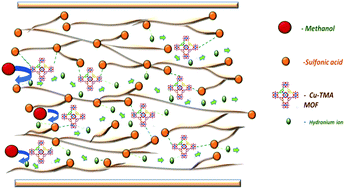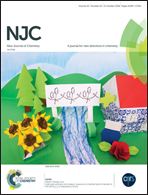A copper–trimesic acid metal–organic framework incorporated sulfonated poly(ether ether ketone) based polymer electrolyte membrane for direct methanol fuel cells†
Abstract
A composite proton exchange membrane comprising a copper–benzene tricarboxylic acid (Cu–TMA) based metal–organic framework (MOF) and sulfonated polyether ether ketone (sPEEK) (SP/CT-MOF-3) for direct methanol fuel cells (DMFCs) is reported. The MOF based composite membrane shows excellent tolerance towards methanol crossover in DMFCs. The effective blocking of pore channels present in the sPEEK by the MOF reduces the permeation of methanol without affecting its proton conductivity. The methanol permeabilities for SP/CT-MOF-3 and pristine sPEEK are 4.26 × 10−7 cm2 s−1 and 7.95 × 10−7 cm2 s−1 respectively. The proton conductivity of SP/CT-MOF-3 is 45 mS cm−1 with an activation energy of 7.27 kJ mol−1 which is better than pristine sPEEK. SP/CT-MOF-3 shows a higher peak power density of 116 mW cm−2 and current density of 570 mA cm−2 in comparison with pristine sPEEK. The improved DMFC performance of the SP/CT-MOF-3 composite membrane electrolyte is attributed to the better ion exchange capacity, water sorption, and proton conductivity of the composite membrane over pristine sPEEK.



 Please wait while we load your content...
Please wait while we load your content...